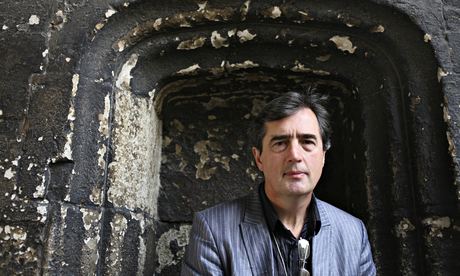
This novel is an elegy – not for a temporary gentleman but for his wife. The prose has the black-bordered elegance of a Victorian mourning letter yet it is, at the same time, a restless recollection of the life of a couple – animated but doomed. It is written with a redeeming artistry – almost as if good writing might have the power to save a marriage or contain the secret of happiness. It manages, with the lightest of touches, to be a politically adroit sketch of Ireland and of colonial Africa in the last century.
Barry, who won the Costa prize with The Secret Scripture (2008), loosely links his fiction – the novels acknowledge each other with a nod. He lets slip here that Jack McNulty is brother to Eneas (from his 1998 The Whereabouts of Eneas McNulty). Jack fought in the second world war, although his commission was never permanent, and became a UN observer and a gunrunner in Africa. We meet him, in 1957, in Accra lodgings, waited on by a houseboy, Tom Quaye, whose marital circumstances partly parallel his own.
Jack is at work on a memoir and with Barry's help we get to know him better than he knows himself. The pleasures of reading this novel are not dissimilar to reading Jane Austen – although darker – in that one is allowed to make moral judgments in advance of the characters themselves – although Jack is, eventually, permitted to catch up – writing his way into culpability.
The book opens with a tumultuous near drowning off the coast of Africa: a second world war submarine torpedoes a ship. Although far from home, Jack affectingly relates the catastrophe to Ireland: "The deck broke the waters, it smashed through the sacred waters like a child breaks an icy puddle in a Sligo winter." Sentences, sometimes a page long, add to the mounting panic of the ship going down, as if the prose, in all its unbroken lyricism, were holding its breath.
Earlier, in Ireland, Jack's wife, Mai, is introduced with tender particularity. As a young woman, she is a supporter of Michael Collins (the Irish revolutionary leader) and has a fierce gaiety to her every move: "I watched her open the big front door, go in, drag off her hat and scarlet coat and, with her right boot raised behind her like a skater, without looking back out into the dreary evening, kick the door shut."
From the start, drink is the demon in Jack and Mai's marriage. Jack downs several whiskies before an audience with his father-in-law, characterising himself, with reason, as a "dubious beau". He imagines his father-in-law worrying about the effect on his daughter of "west of Ireland drinking, diligent, unrestrained, the antidote to the dark rains and the year-long winter". I love that "diligent" – a drinker's bid for conscientiousness. And as to the dark rains, this is a book of drenchings, of Ghanaian and Irish rainy seasons.
Like a series of magic lantern slides, we view Jack's past. We follow him and Mai to the Gold Coast and see them return to Ireland when Mai is pregnant with their first child (she causes a stir by bringing back an outlandish pet monkey too). A brilliantly abject scene describes the moment she realises her family house in Sligo must be sold to pay off Jack's gambling debts – the bright smile she gives him when she realises he has gambled away her last sovereign is devastating. No surprise then when Mai takes to the bottle too. Yet, in the end, this rare and heart-breaking novel's subject is not drink at all – it is erring, selfish, enduring love.

